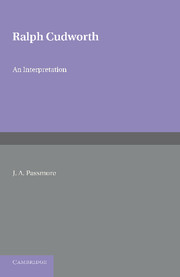Book contents
- Frontmatter
- Contents
- Preface
- Abbreviations
- CHAPTER I Cudworth and his Predecessors
- CHAPTER II Cudworth on Mind and Nature
- CHAPTER III Cudworth's Theory of Knowledge
- CHAPTER IV ‘Eternal and Immutable Morality’
- CHAPTER V Cudworth's Moral Psychology
- CHAPTER VI The Good Life
- CHAPTER VII Ethics and Religion
- CHAPTER VIII Cudworth and the British Moralists
- Appendix: The Cudworth Manuscripts
- A Cudworth Bibliography
- Index of Names
CHAPTER IV - ‘Eternal and Immutable Morality’
Published online by Cambridge University Press: 05 June 2016
- Frontmatter
- Contents
- Preface
- Abbreviations
- CHAPTER I Cudworth and his Predecessors
- CHAPTER II Cudworth on Mind and Nature
- CHAPTER III Cudworth's Theory of Knowledge
- CHAPTER IV ‘Eternal and Immutable Morality’
- CHAPTER V Cudworth's Moral Psychology
- CHAPTER VI The Good Life
- CHAPTER VII Ethics and Religion
- CHAPTER VIII Cudworth and the British Moralists
- Appendix: The Cudworth Manuscripts
- A Cudworth Bibliography
- Index of Names
Summary
‘Eternal and immutable morality’ was the rallying-cry of eighteenth-century rationalists in their controversial battles with ‘men of feeling’ and Cudworth has kept his place in the history of ethics as the originator of this slogan. Precisely what the slogan meant for Cudworth cannot fully be understood without the help of his manuscript remains. Cudworth's Treatise Concerning Eternal and Immutable Morality was not intended for separate publication; it contains prolegomena to ethics, not ethics itself, and, as Cudworth fully realized, the prolegomena without the ethics are bound to seem incomplete and insufficient. Writing to Worthington, on the occasion of his quarrel with More, he says: ‘I cannot be confined merely to one thing, to show that there is such a thing as virtue, that it is not a mere name, without showing what it is. For the showing what it is must prove that it is.’ Yet the Eternal and Immutable Morality, as it stands, is confined precisely to that ‘one thing’ it is an argument, epistemological and logical, designed to prove that virtue is not ‘a mere name’, but the best proof that an objective ethics is possible, viz. the construction of such an ethics, finds no place there.
The importance of the Eternal and Immutable Morality is principally polemical; we see in that work why Cudworth was dissatisfied with the ethics (and, along with that, the theology) most generally current in his own time. As a polemic, it was directed against three main antagonists.
- Type
- Chapter
- Information
- Ralph Cudworth , pp. 40 - 50Publisher: Cambridge University PressPrint publication year: 2013

